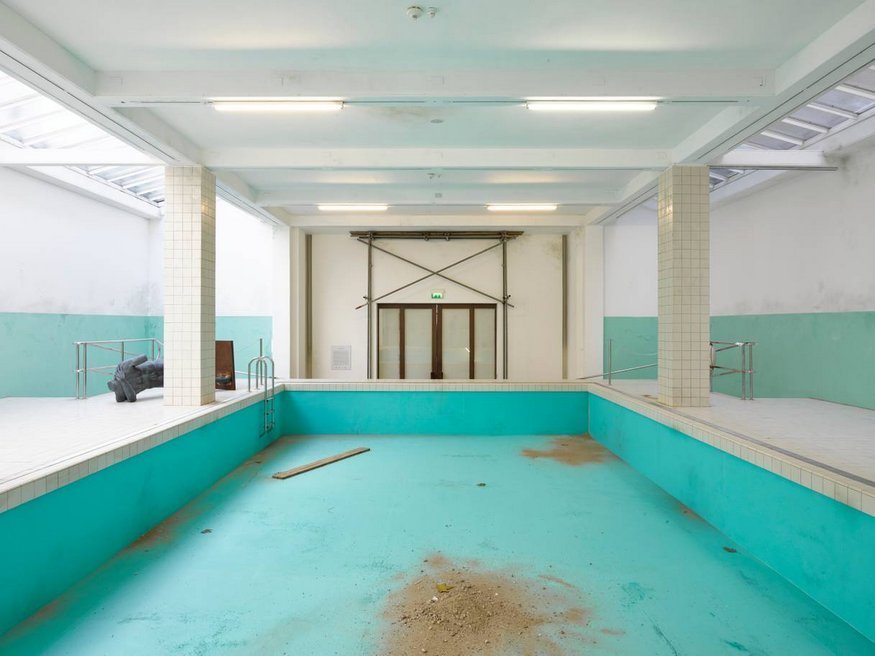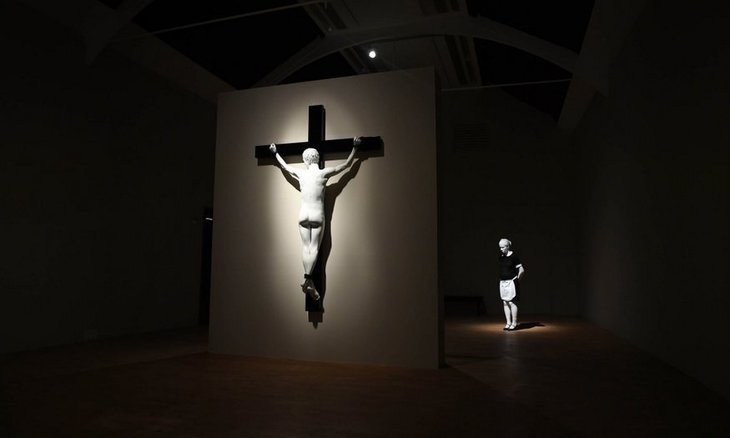An Abandoned Swimming Pool Has Appeared At Whitechapel Gallery
Looks like this article is a bit old. Be aware that information may have changed since it was published.
Last Updated 28 November 2018

A swimming pool was philanthropically founded in Whitechapel in 1901. The people loved it but it closed due to lack of funding in 1987. It then turned into a squat before police raided it in 1989. It's now been bought by a development company who will no doubt turn it into luxury flats. The pool lies empty of water, filled with dust, and a light from the ceiling has partially fallen into it.
The above story sounds like a typical gentrification and loss of civic space story, but it's all fake news — not the Trump kind, but genuinely fake news. The pool has been fully replicated down to the tiles in Whitechapel Gallery. It's a work by the humorous art duo Elmgreen & Dragset who have made this whole story up, including the part that the pool was an early inspiration for David Hockney's swimming pool paintings.

Further playful works by the duo surround the pool, including a trampoline collapsed under a massive rock that's clearly never going to rebound, a changing room door that doesn't open and a headless statue that's fallen over — lacking any of the poise it would have had when it stood tall.
We're big fans of Elmgreen & Dragset, largely because they poke fun at the art world, which often — nay, mostly — takes itself far too seriously, but the works also have a political slant. The impressively realistic pool both messing with our sense of history and makes a comment on the general loss of civic space in the city.

The surreal fun continues upstairs as a vulture hovers over a nest. Is it protecting it, or does it want to feast on some chicks? The vulture is meant to symbolise everyone's inner critic and it's true that we're the person most likely to tear down our own achievements, more so than any Internet troll could. The vulture is meant to represent art critics and general, but this writer sees no resemblance ... though I would say that, wouldn't I?
We're invited to sip on whisky as we flick through a book of the artist's work before we wander over to their self-portraits. But the self-portraits are gone — only a faded outline remains as if they were there for an age but removed just before we arrived. It's all part of the guessing game the duo like to play with visitors. Does it really matter what artists look like to appreciate their work? Would we like the work more if they were good-looking?

To cement how much power we place in a person's image, the show includes massive versions of exhibition labels referring to portraits but none of the actual portraits are to be found. It reminds us of how many people in museums head straight to the label before even trying to appreciate the work in its own right.
A little boy stares up at a framed gun on the wall as if in awe. It's both unsettling and spot on given how gun culture glamorises firearms and how easy it is for children to get hold of guns in many countries.
Art can be fun and it can be political too, but rarely the twain meet. However, Elmgreen and Dragset manage to bring the two together with works that are both playful and thought provoking. This excellent exhibition is a reminder of why we've always been, and continue to be, massive fans of their work.
Elmgreen & Dragset: This Is How We Bite Our Tongue is on at Whitechapel Gallery until 13 January. Tickets are £12.95 for adults.




